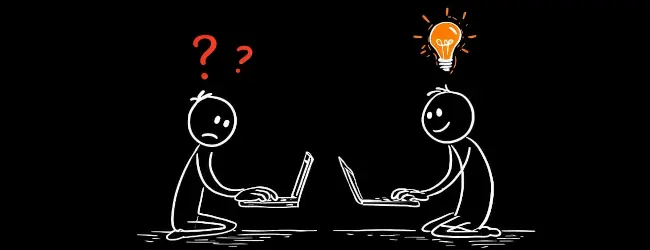Since I have a terrible physical condition, let’s talk about something philosophical briefly.
How to find an answer to a question without an answer
Sometimes, we desire a clear answer, especially when we lose confidence.
A right answer frees us from the stress of worrying. In other words, we want to be freed from stress rather than having an answer.

However, that makes it difficult for logical people like us to resolve that want. We cannot accept unreasonable answers, even if they are those of authorities. It means we have to get a persuasive answer in some form, even if there is no answer.
One solution is using rationality. It provides us with reasonable answers and durability to chaos. Today, I will explain why.
The questions without an answer
There are questions without clear answers. We can create them easily from the following perspectives:
- Seeking a universal form in things that change depending on perspective
- Seeking something that the senses cannot perceive
- Seeking boundaries in continuous things
The following are typical examples:
- What is love?
- What is the shape of the mountain?
- What is the role of the individual?
- Do the gods exist?
- Does the afterlife exist?
- Will AI become as lifelike as humans?
- Where do we draw the line between good and evil?
- Where does the Earth end, and where does space begin?
- What are the boundaries between self and others?
They are questions without clear answers.
The rational answer
Rationality provides us with a reasonable answer.
Originally, logical sense, which brings rationality, was born to compensate for the parts that cannot be perceived.
For example, we cannot see through the wall. Our eyes don’t allow us to see through things that are not transparent. However, we can deduce what is on the other side of that wall from the surrounding information. We might hear the growing of living creatures, see the shadow cast by sunlight, and find footprints around. That allows us to make guesses and calms us.
In other words, they are not about finding universal value but about determining value that we consider reasonable. Happiness, meaning, role, difference, criteria, and boundary—they are referential words without a specific substance. They are things that only become effective when we determine the content moderately according to the context. They are different from material words, such as iron, paper, wood, and water. Confusion about them creates a question without an answer.

That awareness provides us with a reasonable range as an answer and tolerance for chaos. Since we think under uncertainty, we avoid making assumptions. We are aware of the possibility of the unexpected, so don’t fear unknown outcomes. Instead of focusing on the unknown, we pay attention to the information around it.
That perspective allows us to ask the purpose of seeking the answer. The purpose is often to fulfill ourselves.
Identifying the essentials in life is also a form of rationality. When exhausted, there is no point in having more stress from asking questions without an answer. We have to stop considering it moderately.
That makes us strategic and satisfies the purpose of asking the question in reality.
Conclusion
That is my current answer to a question without an answer.
Rationality provides us with a reasonable answer and tolerance for chaos.
That awareness might satisfy you when you want a clear answer.
Thank you for reading this article. I hope to see you in the next one.


